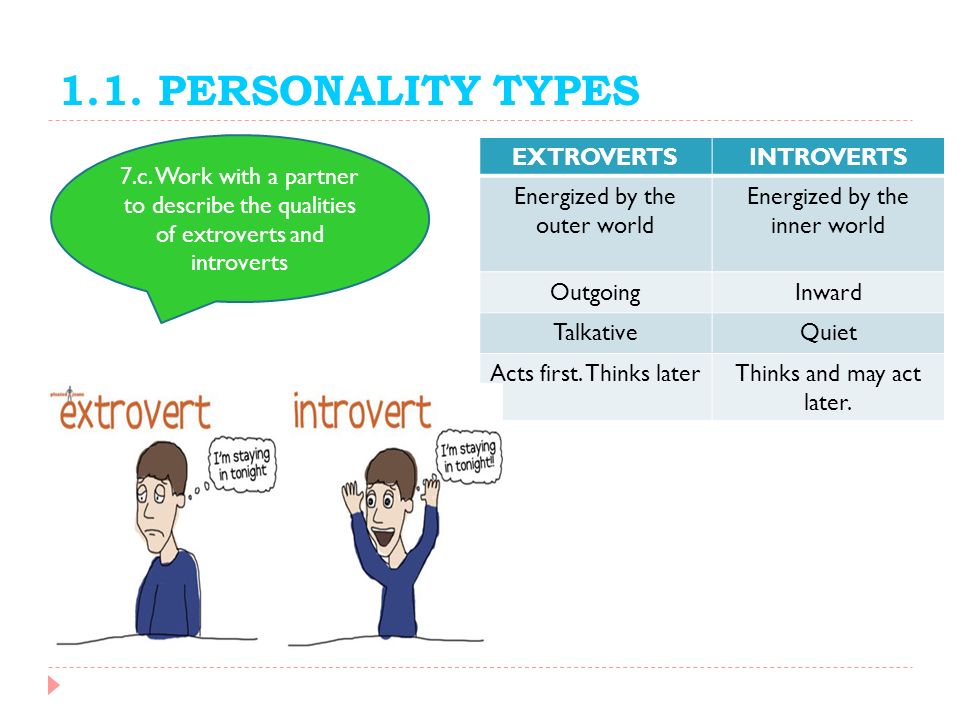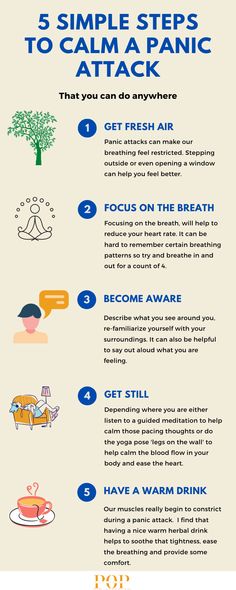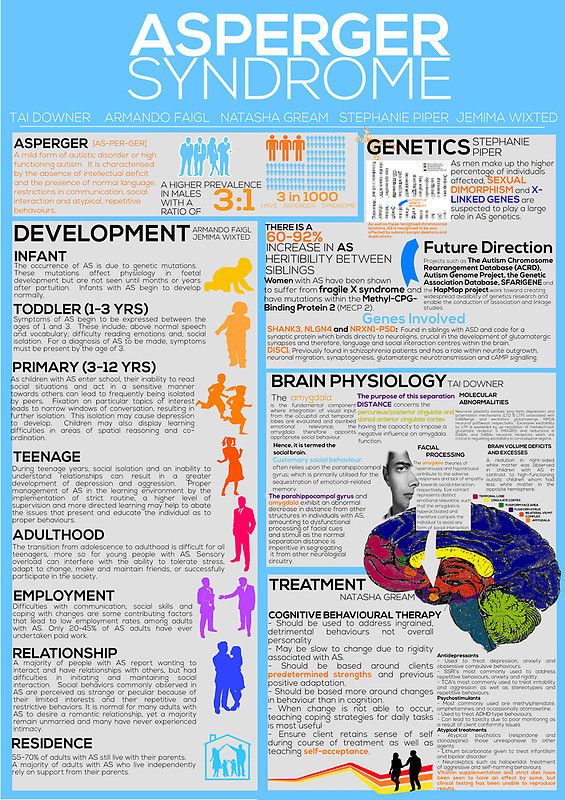Can introverts change to extroverts
Can an Introvert Become an Extravert? Here's What the Science Says
If you’re an Introvert, you’ve probably been told you’d be happier, more successful at your career, more fun, or just plain make the Extraverts more comfortable if you’d only decide to be more like them.
Is any of it true? Should you, like the proverbial leopard, want to change your spots and become an Extravert? And even if you wanted to, could you?
Let’s take a look at a bit of the science behind extraversion and introversion and see if you could change your core personality type.
Can an Introvert become an Extravert?
Science says yes…to a degree.
Like many opposite traits, introversion and extraversion are on a spectrum, and different people lie at different places along the spectrum.
Some Introverts are definitely “more introverted” than others. And it often depends on the situation. It is very possible for an Introvert to have some extraverted tendencies, and to enjoy employing them in certain situations – and vice versa for Extraverts who display more introverted tendencies.
We also may change somewhat over time. If you started out very introverted, you may develop more extraverted traits later in life. Or you may consciously choose to develop your capacity for extraversion.
But either way, it’s not the same as being an Extravert.
The effect only lasts for a little while
Most of us can practice exhibiting our non-dominant trait for short periods of time or in certain situations.
Perceivers can learn to flex their Judging muscles and be more decisive, Intuitives can practice using and enjoying their senses, and yes, Introverts can practice being more outgoing, expressive and social, more like their Extravert counterparts.
In other words, we can definitely choose to act more like Extraverts, for a time.
But it takes effort and energy to swim upstream, so to speak. It’s probably possible to do now and then, and it may be worth doing at times. But behaving differently isn’t the same as changing who we are at our core.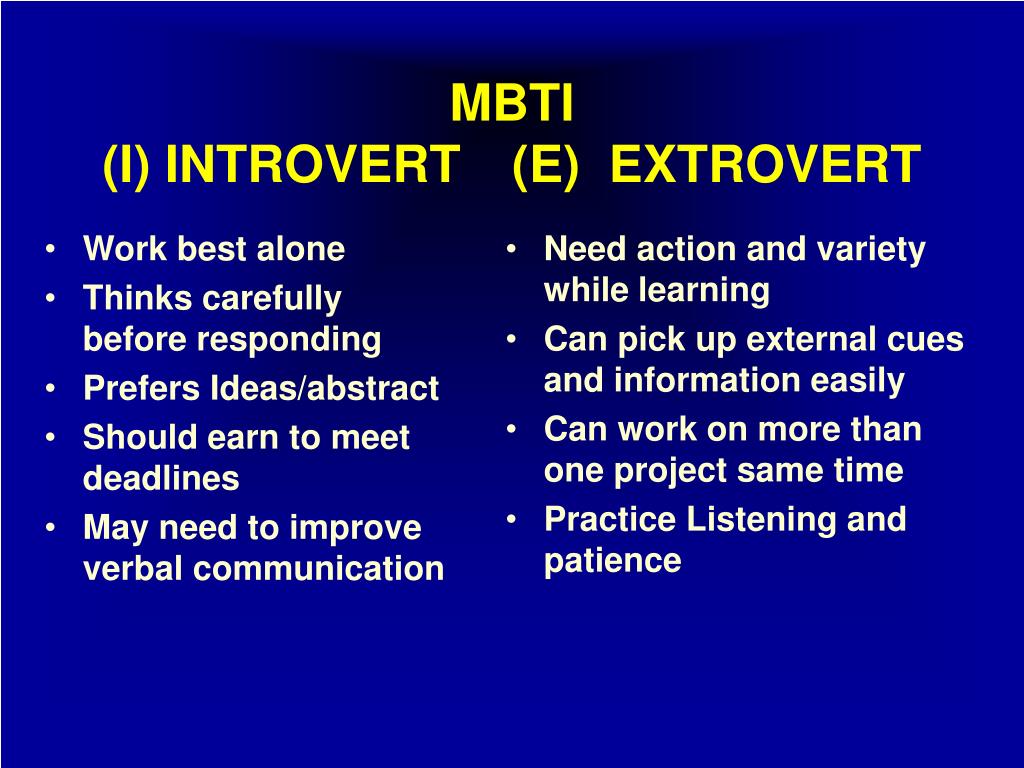
And trying to be something we’re not can be exhausting. So, why is it that we’re one way or another? And can we really become our opposite?
But can you really “switch sides”?
Can an Introvert become an Extravert? That’s probably about as likely as being able to change your blue eyes to green. You could, of course, wear colored contacts, to make them look green, but they would still be blue underneath.
Eventually, you have to take the contacts off, and your true color will be revealed. Also, after you wear them for a while, they’ll likely irritate your eyes and make you tired.
Similarly, while we can ‘act’ extraverted for periods of time, that won’t change our underlying introversion. And if we force ourselves to act against our nature for too long, we’ll be left irritated and exhausted.
Experience and intuition tell us that an Introvert is not likely to be able to change into an Extravert. But is there science to back it up?
Like with much of psychology and personality theory, it’s not all black and white, but science does have something to say about why you’re an Introvert or an Extravert, and why that’s not likely to change.
Introvert and Extravert brains are different
Whether personality type is inborn or develops in childhood, once it’s fixed, it’s pretty much the way it is. If you’re an Introvert, you can act more extraverted for a while, but pretty soon you have to take the contacts out. In short, you are what you are.
There are several differences in brain activity, structure, and neurotransmitters in the brains of Introverts versus those of Extraverts.
It isn’t certain whether we’re born a certain way – though there are some arguments for a genetic component – or we become the way we are because of early influences.
What is known is that there are definite, measurable differences between Introverts and Extraverts, and our brain chemicals and activity shed some light on how and why we’re different.
In our article The Science Behind Extraversion and Introversion, we summarize three differences in the brains of Extraverts and Introverts.
-
“Introversion is associated with increased activity in frontal lobe regions.
 ”
”
A study using PET scans showed that cerebral blood flow was increased in the frontal lobes for Introverts, “while extraverts had lower blood flow in regions associated with behavioral inhibition.”
-
Another difference has to do with dopamine. Extraverts may have greater sensitivity to dopamine, which is responsible, in part, for greater responsiveness to rewards from our environment. This increased dopamine/reward sensitivity may be “due to a greater number of dopamine receptors in the midbrain.”
-
“Introverts have greater blood flow on a certain acetylcholine pathway in the brain.”
According to quietrev.com, “Like dopamine, acetylcholine is also linked to pleasure; the difference is, acetylcholine makes us feel good when we turn inward. … It also helps explain why Introverts like calm environments.”
So, it could be said that introversion or extraversion is etched into our brains.![]() If you’re an Introvert, there are differences in your brain, so you likely can’t just “become” an Extravert, even if you wanted to.
If you’re an Introvert, there are differences in your brain, so you likely can’t just “become” an Extravert, even if you wanted to.
But is this bad news?
Brown, green, blue, gray, and hazel eyes are all beautiful in their own way, and life would be boring if everyone looked the same.
Chances are, if you’re an Introvert, and you’re good at ignoring all the noise saying you should be more like everyone else (and if you’re really an Introvert that’s exactly one of the things you’re good at) you wouldn’t really want to change.
You might like trying on the other type for fun once in a while. Just like if you’re a jeans and T-shirt kind of person it might be fun to put on a tuxedo or evening gown now and then. But you wouldn’t want to do it all the time.
In the same way, you’re probably happier being your true Introvert self, even if others want you to think otherwise.
And let’s face it – the world needs Introverts too. If everyone’s talking and no one’s listening; if everyone’s at the party or giving a rousing speech and no one’s at home reading, reflecting, and generating new ideas, where would we be?
Introverts and what they contribute are necessary, and we’re more likely to be happy when not constantly working against our nature, whatever others may say.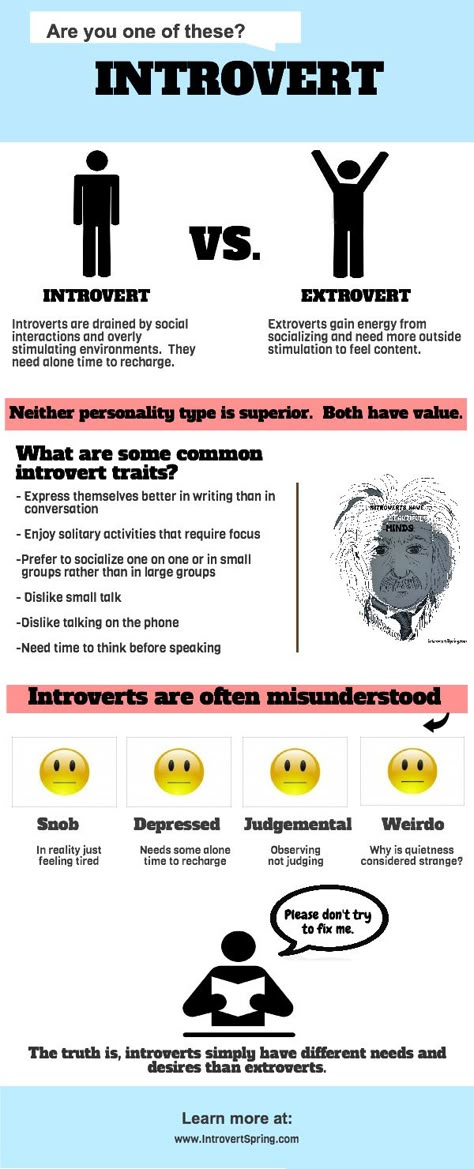
The bottom line
Whether it’s due to genetics, early development, brain response to learned behaviors, or a combination of factors, there are clear differences in the strengths, preferences, and even the brains of Introverts as compared to Extraverts.
While we can certainly develop our non-dominant traits, such as extroversion, and each of us lies somewhere different on the “spectrum,” there is still a clear difference in whether we are an Introvert or an Extravert.
There is a difference between exercising Extravert behaviors, which is possible for a while, and changing our nature to become an Extravert which, since it goes against our natural personality and brain makeup, probably is not truly possible.
Fortunately, there are strengths associated with each trait, so we – and the world around us – are likely better off if we use our energy to work with instead of against our dominant trait.
Can an Introvert become an Extravert? Probably not. Would we want to if we could? Again, probably not.
Can An Introvert Become An Extrovert? We Asked Psychologists How It’s Done
Many of us are familiar with the concept of introverts and extroverts. Some people, according to this theory of personality, recharge socially in environments with a lot of people, while others expend a lot of energy in social situations and need to recharge their batteries on their own. The former are extroverts, the latter introverts — but the boundaries between these two categories are pretty fluid. Experts tell Bustle that there's some evidence that even the most dyed-in-the-wool introverts can adopt some extrovert tendencies. However, they say, a complete category shift — changing from an introvert who loves staying at home with the cat to an extrovert who finds time at parties invigorating — is virtually impossible, particularly as we get older.
The concept of introversion and extroversion isn't actually that old. "It was popularized around the 1920s and 1930s by the writings of Carl Jung and later utilized in the Myers-Briggs Type Indicator," Dr. Trey Armstrong, Ph.D., of the Texas A&M Department of Psychiatry, tells Bustle. You've likely taken Myers-Briggs personality tests online. These days, we know a bit more about introvert and extrovert tendencies — including the fact that introversion isn't necessarily shyness, and that extroverts aren't necessarily socially invincible.
Trey Armstrong, Ph.D., of the Texas A&M Department of Psychiatry, tells Bustle. You've likely taken Myers-Briggs personality tests online. These days, we know a bit more about introvert and extrovert tendencies — including the fact that introversion isn't necessarily shyness, and that extroverts aren't necessarily socially invincible.
Mark Nazh/Shutterstock
Clinical psychologist Dr. Josh Klapow, Ph.D., tells Bustle that introversion "is a tendency to respond to the world in an inward fashion versus an outward fashion. Introverts process information, synthesize the world around them and make decisions about how to engage in the world in a much more solitary and internal manner. This is not to say they are antisocial, shy, afraid, anxious, or aloof." However, introverts can sometimes long for the other side of the equation; as a definite introvert myself with an extrovert partner, I've often been annoyed that I feel so exhausted after a social occasion, and wondered what it would be like to be less internal in my processing.
I'm not alone. The pressure to be less introverted can be intense. "We live in a society that celebrates extroversion," psychologist Dr. Erika Martinez, Psy.D., tells Bustle. "In many cases, it's a desire to belong and be accepted that prompts introverts to change."
In fact, a 2020 study of over 800 college students and adults found that, when asked, most people said they wanted to be more extroverted, conscientious, or emotionally stable. Everything from our workplaces to our customary social spaces is structured to reward extroversion; if an introvert has a job that involves networking or public speaking, or wants to meet somebody and start a relationship, they need to push themselves outside of their comfort zones. This, says Klapow, is called "social necessity."
Flotsam/Shutterstock
If you're an introvert who occasionally shows extroverted traits in public, it's possible that it's happening because of this social necessity, Klapow explains. "Because we live in a world where outward social interaction is valued, and is the norm, introverts often find themselves interacting in a more extroverted manner at work, in social situations, in relationships in order to gain the approval and acceptance of those around them," he tells Bustle.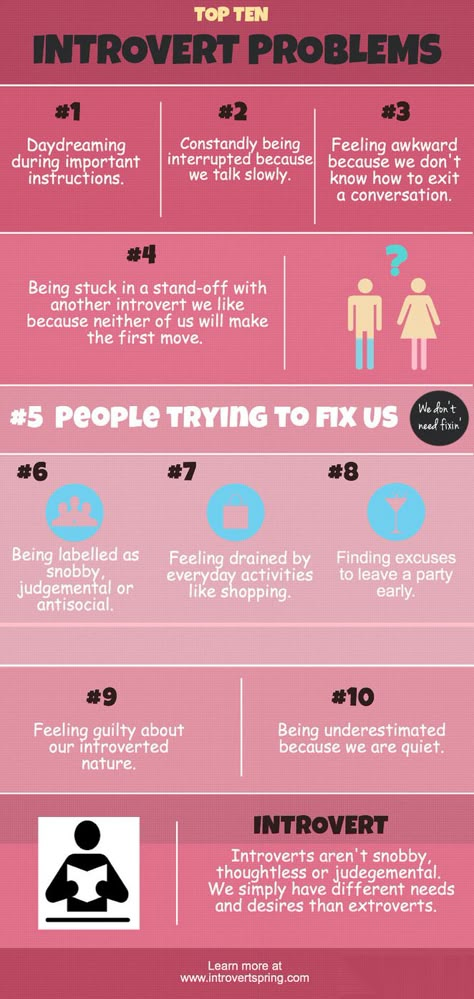
An introvert changing their behavior to be more extroverted is definitely possible, but it has to be intentional — and it's also difficult. "Think of it like swimming upstream against the current — it's possible, but draining, too," says Martinez. Introverts will also encounter differing levels of success in the endeavor, experts tell Bustle. Some introverts may adopt extrovert tendencies to get by in public, but never feel completely at home with them, while others may become more comfortable with them through habit. An introvert who practices extroversion regularly, says Klapow, may find that extroverted behaviors "begin to feel more commonplace, and are embraced and even looked fondly on."
However, this doesn't mean that introverts with these capacities are becoming more extroverted by nature. Introverts, says Martinez, can look like extroverts — "they can learn to exhibit extroverted behaviors, manage their anxiety, and environmental stimulation," she says — but that won't change their fundamental nature. "Their temperament will still lean toward introversion, and they'll likely need periods of rest to recover after being extroverted," she tells Bustle.
"Their temperament will still lean toward introversion, and they'll likely need periods of rest to recover after being extroverted," she tells Bustle.
Prostock Studios/Shutterstock
Research also indicates that it's extremely unlikely you can shift your introversion to be entirely extroverted, or vice versa. Armstrong tells Bustle that studies show personality traits are pretty stable after you turn 30. "There are some minor changes that occur over time but usually to a nonsignificant degree," he says.
The 2020 research on adults and college students, published in the Journal of Research in Personality, found that largely, people weren't able to consciously change their personalities. When they followed up with the college students six months later, they actually changed to have less of their desired personality trait than when they were first asked. Even if an introvert has refined or altered their behavior to become more extroverted, they'll likely fall back onto their original ways when they're tired, stressed, anxious, or exhausted.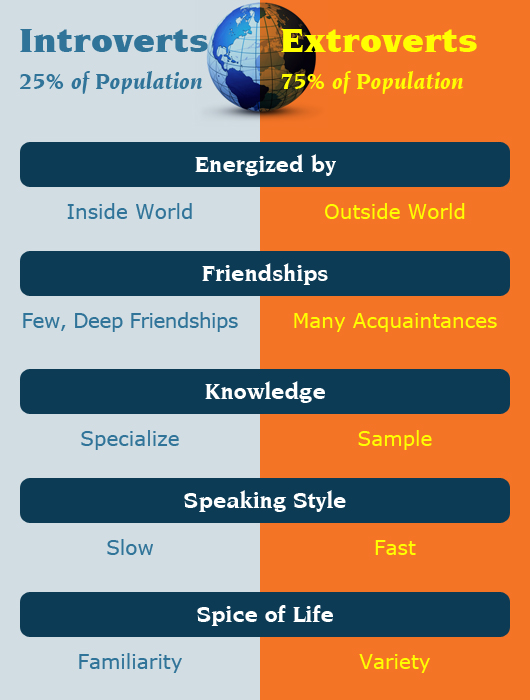 This, says Klapow, is called our "fallback state." If you're an introvert who's gradually trained yourself to show more extroverted traits, you may find that when you're under a lot of pressure, you begin to show introvert tendencies again.
This, says Klapow, is called our "fallback state." If you're an introvert who's gradually trained yourself to show more extroverted traits, you may find that when you're under a lot of pressure, you begin to show introvert tendencies again.
Introverts aren't fixed in their introverted state and can learn extroverted behaviors that make them seem more like extroverts — and even become very comfortable with extroversion. However, that doesn't mean they're innately extroverts. If you're an introvert who has learned to fake it till you make it in extrovert-friendly situations, you'll always need to go home and recharge eventually. Preferably with the door shut and a nice cup of tea.
Experts cited:
Dr. Trey Armstrong, Ph.D., of the Texas A&M Department of Psychiatry
Dr. Josh Klapow, Ph.D., clinical psychologist
Dr. Erika Martinez, Psy.D., psychologist
Study cited:
Erica Baranski, Jacob Gray, Patrick Morse, William Dunlop. From desire to development? A multi-sample, idiographic examination of volitional personality change. Journal of Research in Personality, 2020; 85: 103910 DOI: 10.1016/j.jrp.2019.103910
Journal of Research in Personality, 2020; 85: 103910 DOI: 10.1016/j.jrp.2019.103910
This article was originally published on
Question to the expert: "Can an extrovert become an introvert?"
“This question has been tormenting me for several days now. I asked it to everyone I know and whom I don't know. I asked professional psychologists and teachers, no one gives a definite answer, opinions are divided. One thing unites people: almost everyone perceives introverts as something negative and uncomfortable. And I think that initially we are all ambiverts, but as we grow and develop, while we are brought up, some qualities from one side or another begin to prevail in us. Therefore, during the formation of a personality in the puberty period, we already classify ourselves as extra- or intro-. But we are always changing - and the inner world, and views, and circumstances, and the environment - and our temperament is also subject to change.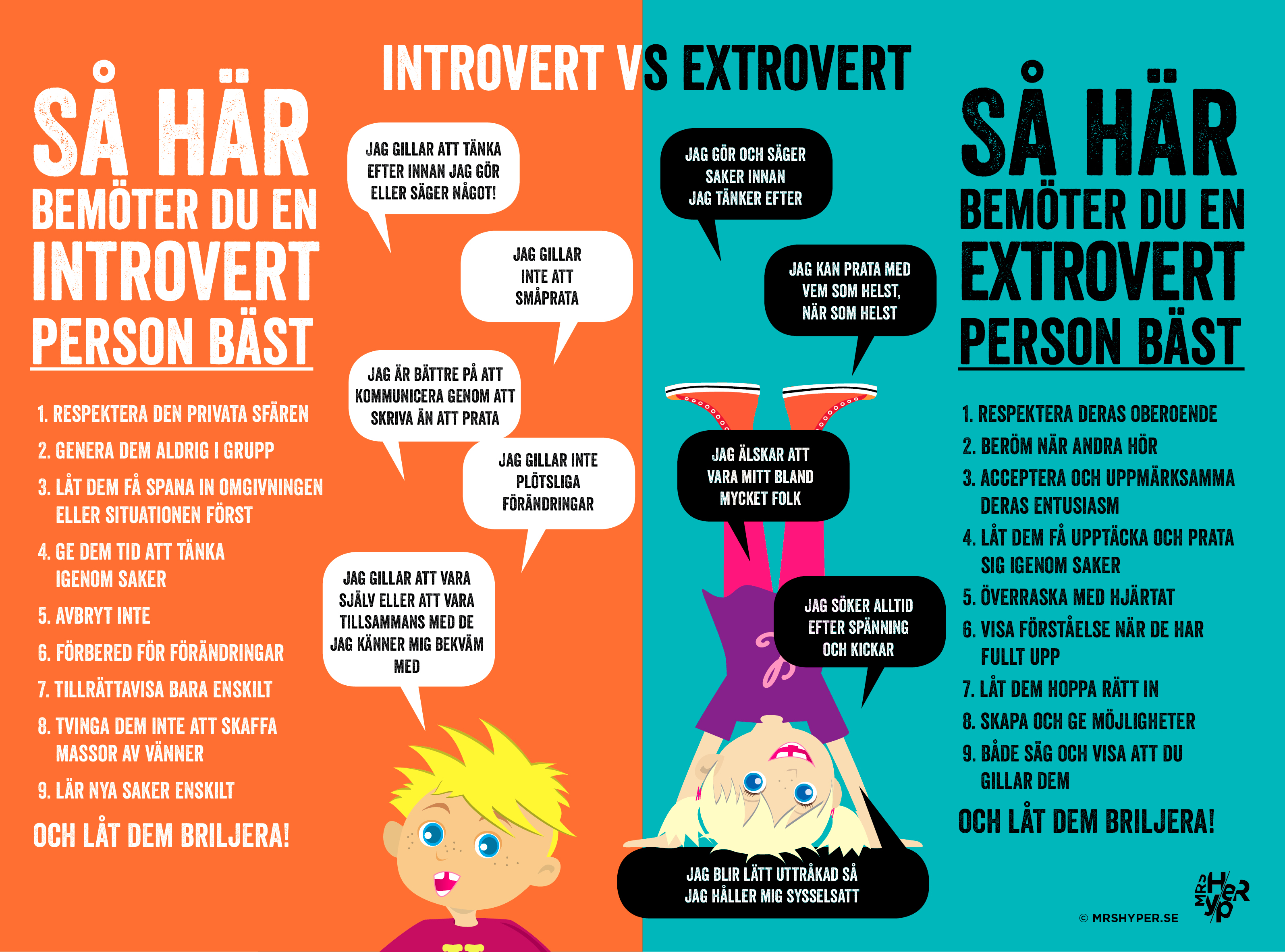 So an extrovert can become an introvert and vice versa, but the second is more difficult because of the stereotypes of society. I address you as an authority in the field of psychology. What do you think about this and why? nine0003
So an extrovert can become an introvert and vice versa, but the second is more difficult because of the stereotypes of society. I address you as an authority in the field of psychology. What do you think about this and why? nine0003
Sandra, 23
Larisa Kharlanova, psychologist:
“Hello, Sandra!
Introversion or extraversion is not something that can be brought up in us - just like temperament, however.
If we acquire this way of communicating with the world, it is very early in childhood. All we can do is keep this personality in mind when making important career decisions or when we face something that is very difficult for us to do and difficult to participate in. People evaluate introverts negatively because they do not really understand what is at stake. This is easily confused with schizoid traits or autistic manifestations. nine0003
We have little chance of developing the other side of ourselves in much the same way as the dominant side.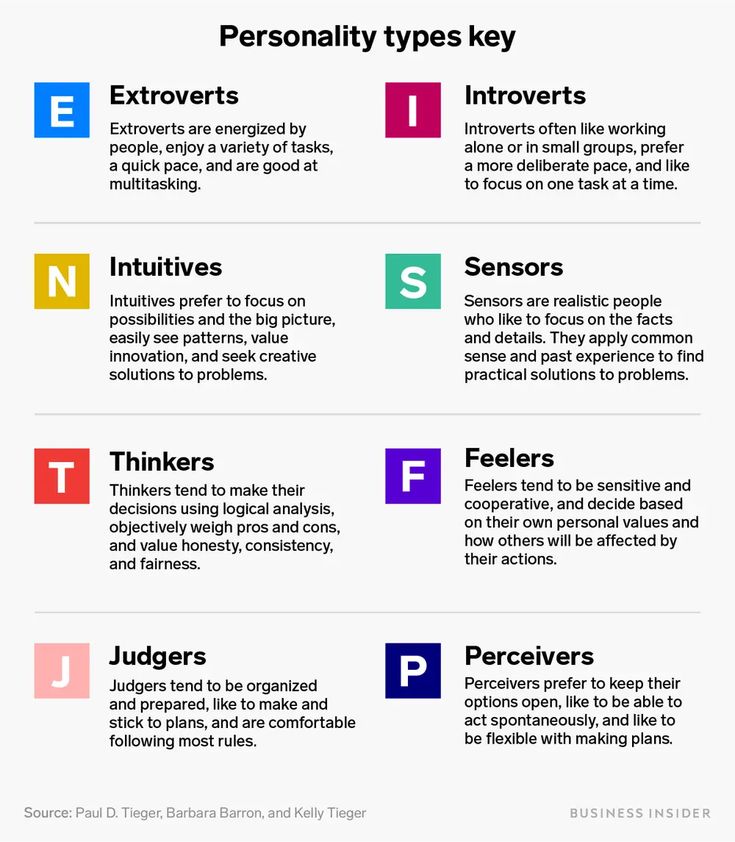 When raising children, choosing activities for them, it is very important to take into account their characteristics, protecting them from unnecessary overwork. But it is known that many people become more extroverted in the second half of life and vice versa, introversion becomes available to extroverts.
When raising children, choosing activities for them, it is very important to take into account their characteristics, protecting them from unnecessary overwork. But it is known that many people become more extroverted in the second half of life and vice versa, introversion becomes available to extroverts.
Recently, in the auditorium of a psychological club in Zurich, the old building where the Jung Institute was founded, the phrase was heard: “I understand that 90% of the people present here now are introverts, but I suggest ... "The leader of the meeting suggested that everyone stand up and get to know as many people as possible, the time for each "meeting" was limited and it was necessary to go to another person by the sound of the gong.
It is known that most people who choose the profession of a psychologist are introverts. For example, it was difficult for me to talk and meet a new person every 5 minutes, but when I realized that this was only because I was an introvert, that, after all, on the contrary, the same person and that everything, in the most difficult case, is limited In 5 minutes, I was able to relax, turn it into a game for myself, and enjoy the conversation.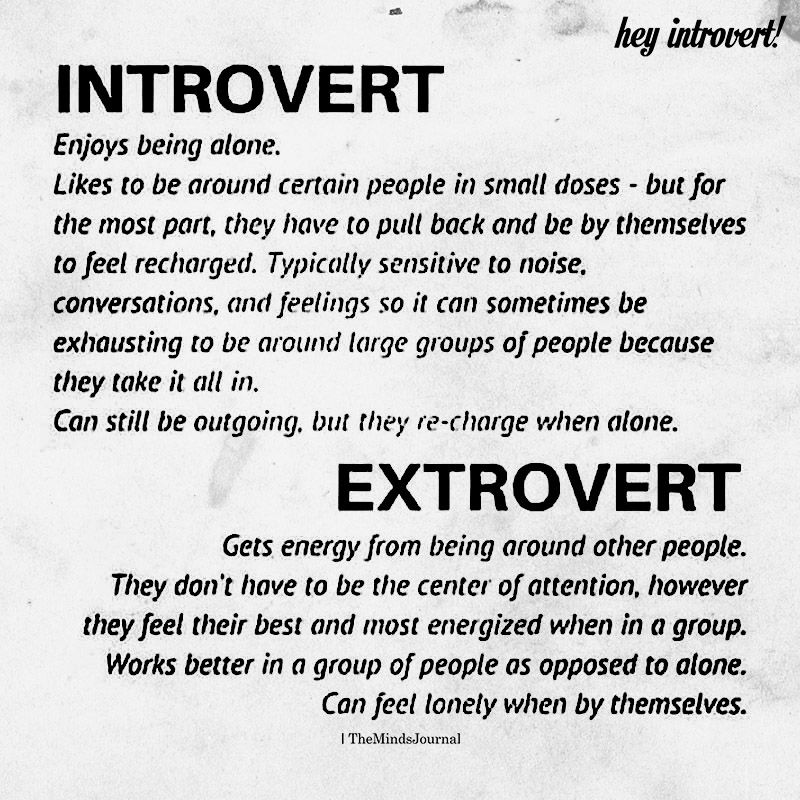 And an extrovert would not even think for a second, starting to communicate. nine0003
And an extrovert would not even think for a second, starting to communicate. nine0003
An introvert is not someone who can't communicate, it's a person who always and above all turns to himself. An introvert can behave like an extrovert, but this will require more mental energy from him.
Can an introvert become an extrovert
All people of our planet are unique and inimitable. But, interacting with society, one can easily notice that the behavior and attitude to life are similar for some, while for others they are radically opposite. It is thanks to this similarity that we can be united into groups of “our own kind” according to some specific character traits, behavior and qualities. This is what I did at 1921 Carl Gustav Jung is a psychologist, philosopher, psychiatrist and close associate of Sigmund Freud. It was he who introduced into science such concepts known to us today as introversion and extraversion. Thanks to his work, it became possible to conditionally divide people according to the type of temperament into groups of extroverts and introverts.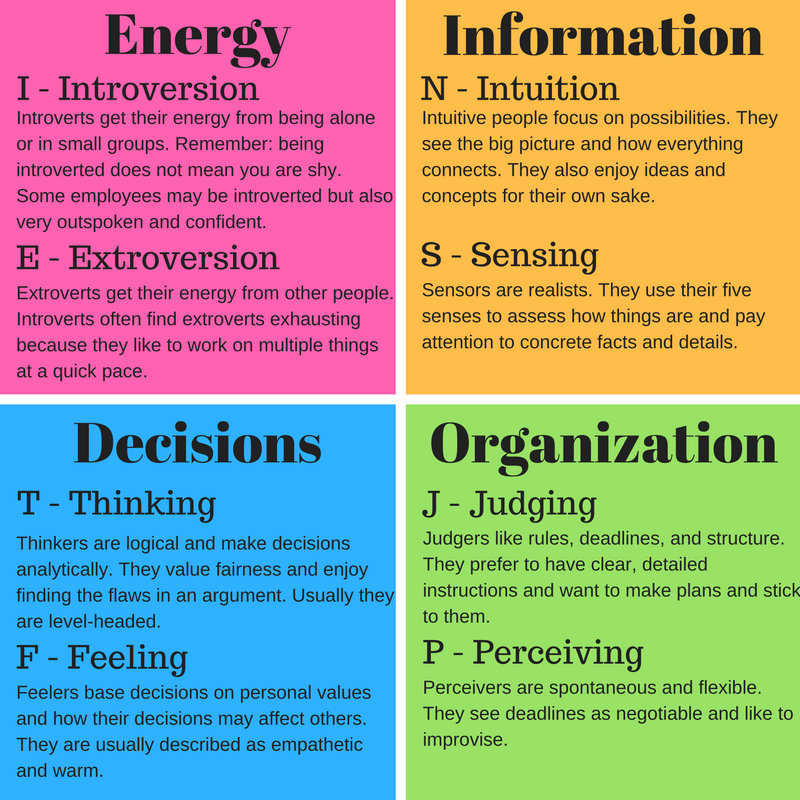
Main characteristics of extroverts and introverts
Jung considered extraversion and introversion to be innate properties of the human psyche. That is, whether a person will be an introvert or an extrovert - it is not upbringing, not society, but nature that decides, since the tendency to one or another type of temperament is inherent in us already at birth. An extrovert is a sociable, open person, prone to maximum interaction with the outside world and enjoying it. It is difficult for him to sit still and be fixated on some experiences for a long time. An extrovert gets energy from interacting with people and feeling like an integral part of society. In the crowd, you can easily notice an extrovert - this will be a person who speaks a lot and confidently, is the first to answer a question posed to a group of people, many will look at an extrovert and, at times, unconsciously repeat some gestures after him. An introvert is a person immersed into your own inner world.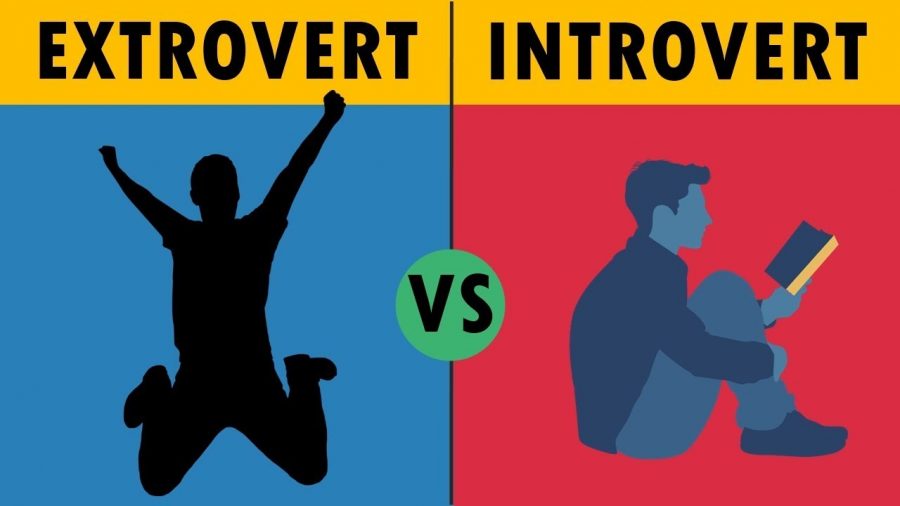 He is comfortable spending a lot of time with himself and it charges him. An introvert feels separated from society and living by his own rules. He does not need to discuss his personal plans, affairs or problems with someone, he is his own friend and adviser. Some people think that extroverts have an easier life, however, this is not so. It all depends on the situation, because in some cases it is better to show extraversion (negotiate with someone, get acquainted, get a job), and in others introversion (understand yourself and your true desires and goals). nine0003
He is comfortable spending a lot of time with himself and it charges him. An introvert feels separated from society and living by his own rules. He does not need to discuss his personal plans, affairs or problems with someone, he is his own friend and adviser. Some people think that extroverts have an easier life, however, this is not so. It all depends on the situation, because in some cases it is better to show extraversion (negotiate with someone, get acquainted, get a job), and in others introversion (understand yourself and your true desires and goals). nine0003
Advantages of each type
Extroverts find it easier to live in society, this is their main and undeniable plus. For them, their type of temperament is beneficial for the following reasons:
-
They can be leaders to be followed.
-
It is easy for extroverts to perform in front of a large number of people.
-
They are in the center of attention, so they will always find an interlocutor.
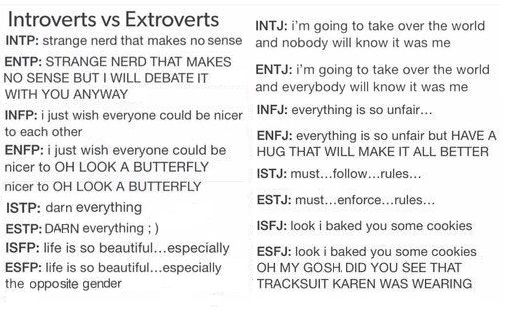
-
Extroverts have a lot of friends and acquaintances, they know who to turn to in difficult times and with whom they can have fun. nine0003
-
People with this type of temperament are not afraid to take risks, so they have many opportunities in choosing professions. They can be leaders.
It is easier and more pleasant for an introvert to be with himself, his advantage is that he easily and with pleasure endures loneliness. This type of temperament also has a number of advantages:
-
Non-conflict introverts.
-
These people are more calm and balanced, which helps them to endure life's troubles much easier. nine0003
-
They accept themselves and other people as they are, without trying to fix the whole world.
-
Introverts find their resource in self-development.
-
It is important for them to be in harmony with themselves, and not with the whole world (which is very reasonable, because you cannot please everyone).
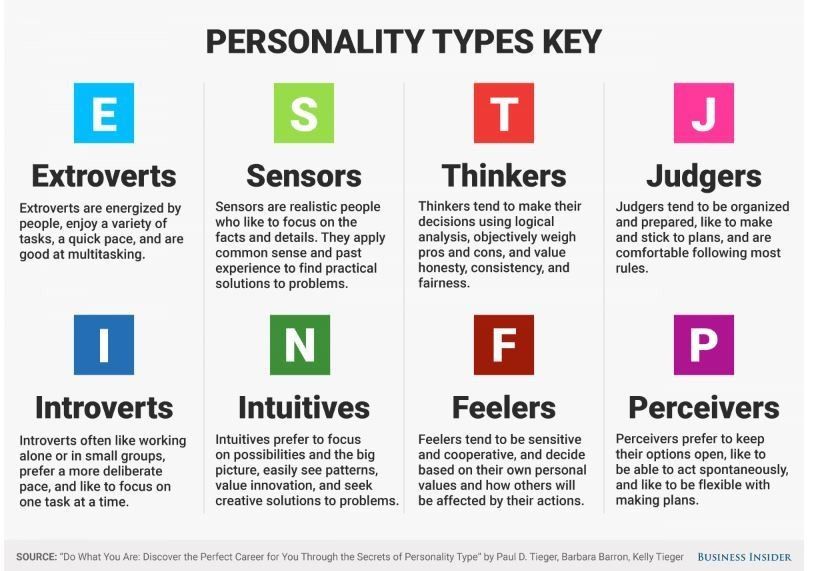
How an introvert becomes an extrovert: useful tips
Many introverts, looking at extroverts, understand that they really lack the same looseness, sociability, deep down they also want a noisy company around them sometimes and they are in the spotlight. And then the question arises for introverts: can they become extroverts. nine0003
Should something be changed
The main thing you need to know, whether you are an extrovert or an introvert, is that both of these temperaments are equal and normal. Both introversion and extraversion are healthy personality traits. Moreover, finding a "pure" one or another type of temperament is not easy, since most people have features of both an introvert and an extrovert, when one prevails over the other a little. Changing your inner essence is not as easy as it seems, and is it really necessary? Many introverts, having been "in the shoes" of an extrovert, noted how exhausting and draining it is, although it is an interesting experiment. nine0003
nine0003
A person whose nature is to take energy from solitude cannot learn to take it from society.
Find the cause
Knowing that extroverts are no better than introverts, consider why you really want such a drastic change in your personality. Perhaps there are people in your environment who belong to the group of extroverts who impress you in some way, and you want to be like them. Maybe you want to take a position where only an extrovert will be successful, and an introvert will experience some difficulties. Maybe you want to have more friends or get more attention from others, like extroverts do. You may have your own reason. But the main thing is that you do it for yourself, and not in an attempt to impress someone by becoming “not yourself”. Take a closer look at your own personality, evaluate how much you really need to change your temperament. Perhaps someone is looking at you and wants to have exactly the same introvert character as you, because there are a lot of advantages in both temperaments. Keep in mind that changing your character is more difficult than changing your hair, so it may be difficult and uncomfortable for you to behave differently. Even when you get a job that involves active communication, you may realize that you made a mistake by taking the wrong one. After all, it would be much easier for someone else, with more developed traits of an extrovert, to perform these functions in your place, and you could become an amazing writer, artist or freelancer and feel comfortable. If you find a good reason for yourself why you are You still need to be an extrovert, which means you are ready to work on yourself. And this is commendable! But first you need to understand that you will not be able to become a “pure” extrovert. Introversion and extroversion are inborn qualities and there is no way to get rid of them, but you can learn to behave as an extrovert and will probably become an ambivert, in which there will be parts of both temperaments. nine0003
Keep in mind that changing your character is more difficult than changing your hair, so it may be difficult and uncomfortable for you to behave differently. Even when you get a job that involves active communication, you may realize that you made a mistake by taking the wrong one. After all, it would be much easier for someone else, with more developed traits of an extrovert, to perform these functions in your place, and you could become an amazing writer, artist or freelancer and feel comfortable. If you find a good reason for yourself why you are You still need to be an extrovert, which means you are ready to work on yourself. And this is commendable! But first you need to understand that you will not be able to become a “pure” extrovert. Introversion and extroversion are inborn qualities and there is no way to get rid of them, but you can learn to behave as an extrovert and will probably become an ambivert, in which there will be parts of both temperaments. nine0003
There are very effective ways to develop the main qualities of an extrovert in yourself.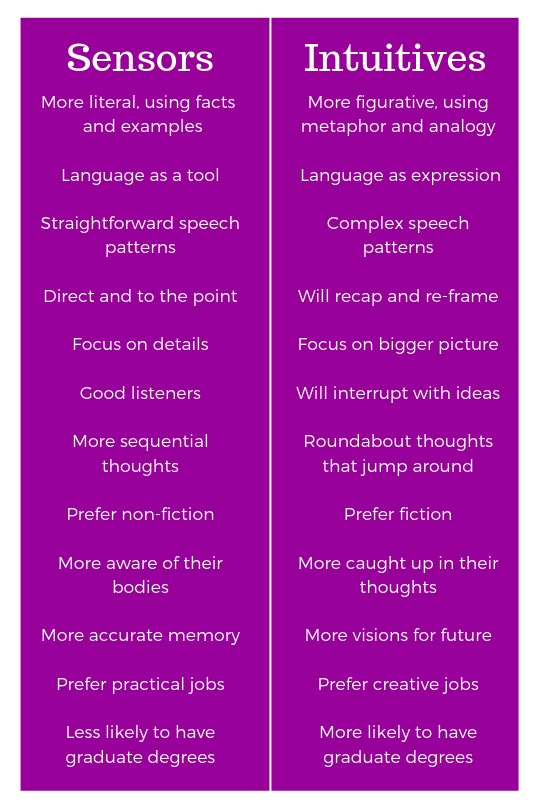
Get out of your comfort zone
Please note that being an introvert does not mean being insecure and stiff, just as an extrovert does not always feel comfortable in an unfamiliar environment among many people. But an extrovert seeks to interact with them. If you are used to sitting within four walls and dreaming a lot, then on the way to “becoming” an extrovert, you will not be able to do this. nine0003
The further you can get away from yourself and your habits, the more you can achieve. All the most interesting things in the world lie outside your personal comfort zone.
Benedict Cumberbat
Watch carefully how extroverts behave at the initial stage, you will have to copy their manner of behavior and communication until it becomes a habit. Attend various events, go out to people. Even if you don't have any friends right now, you can visit many places where you can find them. For example, sign up for sports. Surely, in the gym, pool or dance studio there is at least one person with whom you will be interested in talking.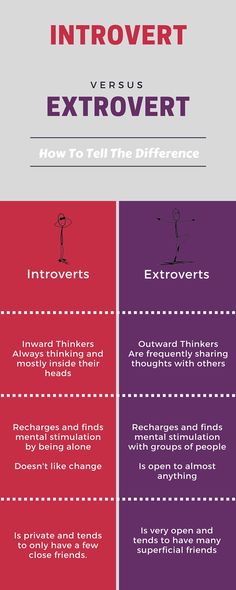 First of all, this person can be your coach. You can also join some kind of interest club, attend master classes and trainings, everything that will be interesting to you and will be useful for your development. So you can not only make new acquaintances, but also significantly upgrade your skills in areas of interest to you! nine0003
First of all, this person can be your coach. You can also join some kind of interest club, attend master classes and trainings, everything that will be interesting to you and will be useful for your development. So you can not only make new acquaintances, but also significantly upgrade your skills in areas of interest to you! nine0003
Communicate
Don't wait, as you did in the past, for someone to talk to you. Try to start conversations more often when the situation calls for it. Note that extroverts are used to keeping in touch with everyone. Call your old friends or acquaintances, take an interest in their affairs and well-being. Start talking more with your family. It's a great idea to start a blog where you get used to talking to a large audience without being afraid of strangers. There you can talk about your life, feelings, deeds, plans, it can be some kind of thematic blog (for example, if you are an artist). And very soon you will notice that you have your own audience that is interested in you and wants to communicate with you.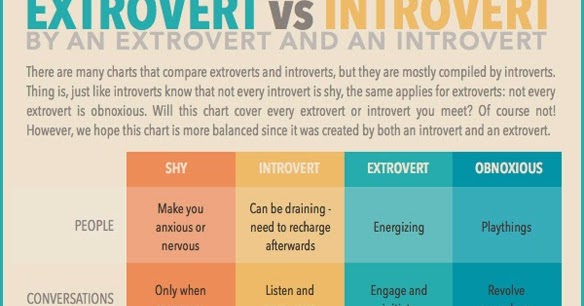 nine0003
nine0003
Feel free to ask for help
Since you have decided to be like an extrovert, be bolder. Extroverts are not at all afraid to attract the attention of others. Be the initiator of meetings with friends, colleagues and family. Gather a company to go together to some event, a walk, or just for spiritual gatherings. Ask loved ones to support you in the idea of changing. Let them not consider your behavior strange, then the awkwardness, which, for sure, will be present right away, will go away much faster. nine0003
Don't be afraid to talk about feelings
Extroverts are open to society and often share their thoughts, feelings and experiences. The easiest way to talk to a stranger and make a good impression on him is to compliment him. It's only important that you be sincere. Start looking for only positive traits in people, both in appearance and in character. For each person, you can find at least one item on the basis of which you can make a compliment.